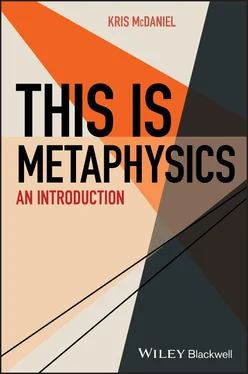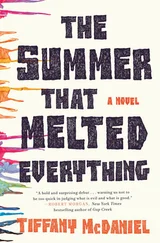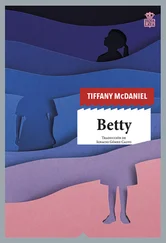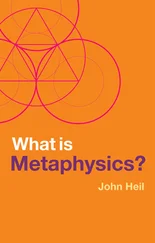1.28 But there are some interesting apparent differences: dogs do seem to form a kind of thing in a way that, say, red things do not. Suppose I tell you that I have a red thing in a box: it would be reasonable to ask what kind of thing it is, and if you did ask this question, and I replied by saying that it is a red thing, or a colored thing, you’d probably think that my answer was pretty weird. Suppose I tell you that I have a dog in a box: it would be a little odd to ask what kind of thing is in my box, though it wouldn’t be at all odd to ask what kind of dog is in my box. (You should probably also ask why I put a poor dog in a box, but since this is a book about metaphysics rather than ethics, we won’t pursue that question further.) We use words like “dog,” “cat,” “car,” “desk,” “proton,” and “human being” to stand for kinds of things, and we use words like “red,” “tall,” “solid,” “fast,” and “furry” to stand for features of things. There might be an important metaphysical difference between kinds of things and features of things. But there is also an important similarity that is relevant to our discussion of classification: we use both of these types of expressions to mark differences in things: these things are the things that are red, rather than those things that are some other color, such as green; these are things that are dogs rather than those things that are some other kind of animal.
1.29 Reflecting on the various ways we use language to classify objects can open us up to new philosophical problems. Here is an interesting thought experiment suggested by Eli Hirsch. 9 Suppose we were to encounter a community of human beings who speak a language that is in many respects like English but with some significant differences. First of all, these people don’t have words for colors like “red,” “purple,” “green,” and so forth in their language, and they don’t even have any words that are synonymous with those words. They also don’t have words for shapes, such as “circular,” “triangular,” and so forth. Although these kinds of words are missing from their language, this is not because the people in this community differ from us in what they can perceive with their eyes. (I suppose that if human beings had never evolved with the ability to see things, we wouldn’t have had words for colors either.) Their language does contain some words that English doesn’t contain. For example, it contains the word “gricular,” which stands for a feature that things have when they are either green or circular, and it contains the word “grincular,” which stands for a feature that things have when they are either green or not circular, and it contains the word “ngricular,” which stands for a feature that things have when they are either not green or are circular. Let’s call this language “the gruesome language.”
1.30 The gruesome language is peculiar. I’ll say a few more things about the gruesome language that will probably amplify that impression. There are some words in English that can be explicitly defined. A stock example is the word “bachelor,” which can be explicitly defined as “someone who is an unmarried, eligible to be married, adult human male.” Competent users of words like “bachelor,” which is a word that is capable of being explicitly defined, should be able to at least gesture at its definition. If a person whose first language is not English asks you what “bachelor” means, it would be appropriate to provide her with the abovementioned definition. But not every word in English is capable of being explicitly defined, even by fully competent speakers of English. When you give an explicit definition of a word, obviously and unavoidably you do this by using other words. Some of these words might themselves be capable of being explicitly defined, but at some point the chain of definitions has to come to an end. There must be some words in English that aren’t capable of being explicitly defined, even by competent users of English. I suspect that words like “red” and “green” are good examples of words that we can’t explicitly define. Suppose a person whose first language is not English were to ask you what “green” meant. You could do the following things to help her out. You could show her samples of things that are green, such as American dollar bills, or the color of grass or leaves in late spring, or if you are especially fortunate, some lovely emeralds. In other words, you would help this person learn what “green” meant by pointing at things that happen to be green . That’s a very different activity from giving an explicit definition of the word “green.” I suppose that you could also say that green is the color that things have when they reflect light with a wavelength of around 510 nanometers, but you shouldn’t think that by doing this you are giving a definition of “green.” Definitions of words are the sorts of things that lexicographers discover, but that green things reflect light of a wavelength in the neighborhood of 510 nanometers is a discovery of physics. Perfectly competent speakers of English hundreds of years ago knew what “green” meant but most of them knew next to nothing about the physics of light. (That’s true of a lot of competent speakers of English today too.) Competent speakers of English can’t give an explicit definition of “green.”
1.31 The speakers of the gruesome language are in a similar position with respect to the words “gricular,” “ngricular,” and “grincular.” If you asked them what they meant by “gricular,” they would have to resort to gesturing at things that are gricular and hope that we get the general idea. A few of the more scientifically literate speakers of the gruesome language might tell us that gricular things are those things that either reflect light of a wavelength of around 510 nanometers or are shaped so that the points on its boundary are all some fixed distance from a center point and from a continuous figure. But they wouldn’t be giving you a definition of “gricular.” What they would be doing instead is similar to what we do when we say what wavelength of light green reflects. Gricular is not a word in their language that can be explicitly defined in terms of other words in their language, not even by speakers fully competent in the gruesome language.
1.32 Speakers of the gruesome language classify things in a way that seems odd to us. Just consider all of the things that are grincular. Is this a list of things that objectively belong together? If nothing objectively belongs together with anything else, then their way of classifying objects is not objectively better or worse in this way, although there might be practical reasons to prefer continuing to classify objects in the way that we do instead of changing wholesale to their systems of classification.
1.33 I am going to begin to develop an argument for the conclusion that some things objectively belong together. This argument turns on the idea that certain words are projectable while others aren’t, and then goes on to claim that a classification system is a bad one if the words it uses to classify objects aren’t projectable.
1.34 The key technical term to be explained here is “projectible.” The very rough idea is that a projectable term is one that you can justifiably use to describe things that you don’t directly perceive. Let’s work our way up to a definition of this key technical term. We frequently make generalizations on the basis of a limited number of observations, and if it is irrational for us to do this, the kinds of generalizations we want to make in the course of doing science are irrational as well. Here are some examples. It’s snowing outside and you don’t want to be cold so you put on a heavy coat rather than just go outside in a t‐shirt. Why do you do this? Because you know that thicker clothing is generally warmer than thinner clothing. This is a generalization that you believe, but it is one that you believe on the basis of sampling a relatively small collection of clothing. There are probably millions of heavy coats in the world, and probably millions of t‐shirts as well. You haven’t tried on each heavy coat. And you haven’t tried on each t‐shirt. Does this shake your confidence that, in general, heavy coats are warmer than t‐shirts? I doubt that it does—although you haven’t sampled every coat and t‐shirt, you have tested enough to be justified in believing the general claim that heavy coats are warmer than t‐shirts.
Читать дальше












